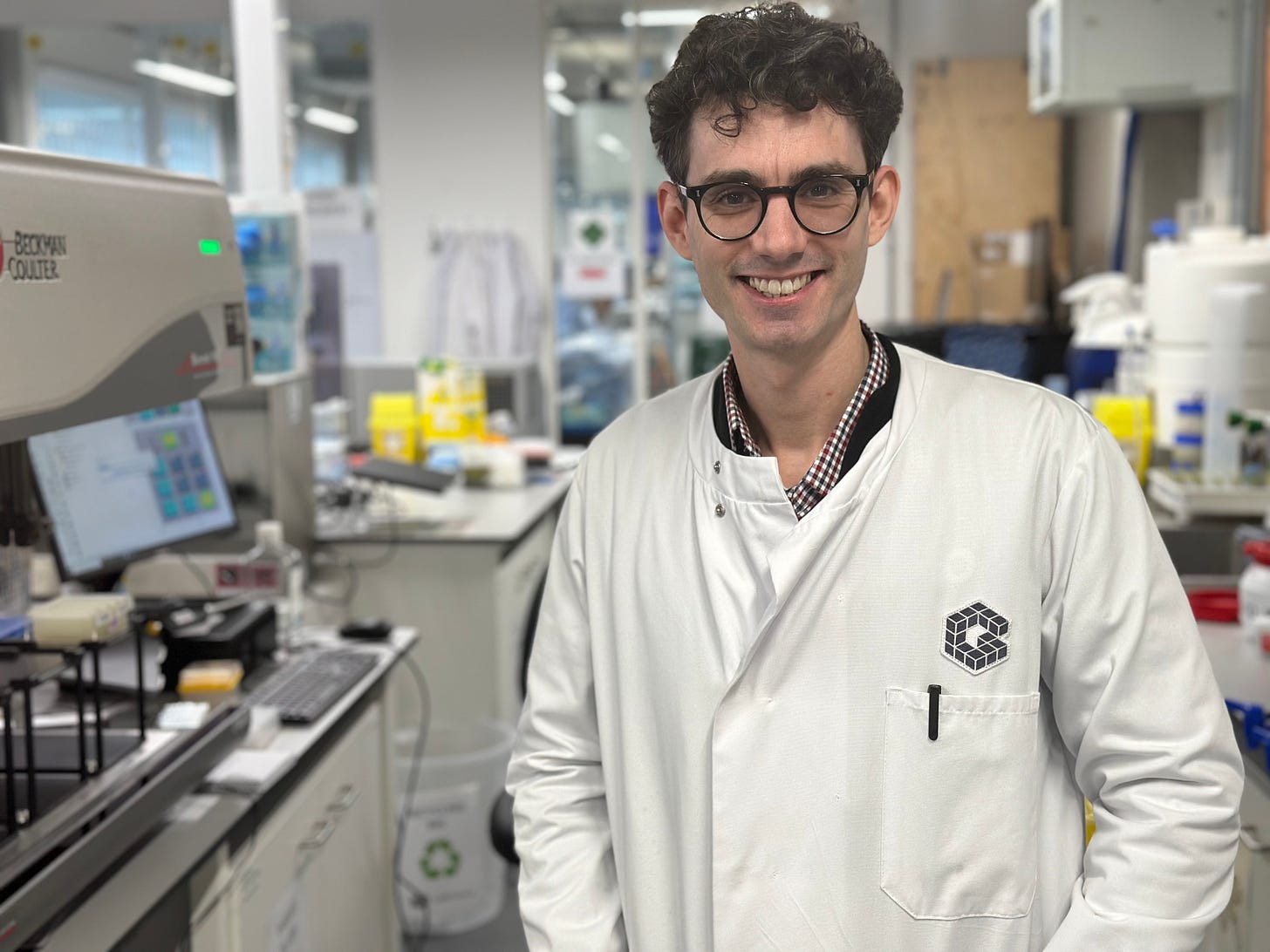LabGenius - the long slow road to faster drug discovery
A former biscuit factory in Bermondsey is not where you expect to find what could be the answer to a big question - will AI transform drug discovery? But standing in a white coat in a lab with the founder of a biotech startup I began to understand why there is such a buzz right now in pharma, big and small, about what artificial intelligence could mean for the industry.
Creating new drugs is a vastly costly and time-consuming business and for those able to use machine learning techniques to move faster in identifying possible treatments, big rewards await. That is the business LabGenius is in and when its founder James Field showed me around the labs in a startup space where the other residents are mostly low tech fashion and design businesses I was impressed.
Highly skilled staff, many with PhDs, were using advanced equipment including £100,000 DNA sequencing machines, and robots were also at work. I watched as a robotic arm transferred plates containing DNA molecules that encode therapeutic antibodies to a liquid handling platform.,
This kind of automation, taking the drudgery out of lab work, is finally becoming more common in the pharmaceutical industry. But the AI secret sauce which LabGenius believes could help it break away from the pack of biotech hopefuls goes far beyond that.
Upstairs in a meeting room with a view over to the City skyscrapers, James Field and his Chief Technology Officer Leo Wossnig - two terrifyingly clever people with PhDs in synthetic biology and computer science respectively - tried to explain to this arts graduate who gave up biology at 14 just what is involved in the search for new drugs.
“The first step is to identify a target,” Leo says. “So, meaning some protein which is in some way related to a disease, which causes the disease.”
James goes on to explain that the key molecule which could be the basis of a blockbuster drug is out there but finding it without spending years going down blind alleys is almost impossible because there are just too many possibilities. That’s where machine learning techniques come in:
“If you can use data and information to start mapping the topology of that space and then rationally searching it, systematically searching it, then the probability of finding something good becomes much higher.”
Proving that their technology works means coming up with a promising molecule, and LabGenius has one, although it is a couple of years away from clinical trials. That means the company will need to raise more money.
It is at this point that I am reminded of how much patience and determination you need to build a biotech company or to invest in one. James Field started LabGenius in 2012 when he was still working on his PhD. At first it went nowhere:”I was just a nobody PhD student who was saying, hey, look, I think we can change the way in which these biological molecules are discovered.” Rightly, he says, venture capitalists were not impressed.
But fortunately the government was looking to invest in a Centre For Synthetic Biology at Imperial College where he was based and he got a grant and lab space to start developing his ideas. In 2018, however, his wife, expecting their first child, gave him an ultimatum - get yourself some proper funding or give up and get a job.
He closed the seed financing round to keep the business going just in the nick of time: “I remember taking the call to close the round from the hospital car park just after my daughter was born.”
In total, LabGenius has raised $30 million and has a workforce of over fifty which will need to grow rapidly if it is going to start running clinical trials. But 12 years after it was born, it has no revenues to speak of, let alone any profits. And James says that it will stay that way for a while - he will focus on the search for promising molecules rather than revenue and in that he is like many NASDAQ-listed biotech companies:
“Really they’re focused on progressing a pipeline and molecules - there’s often no real focus on revenue generation until the point at which one of those molecules is either bought or the company's bought.”
A good outcome for LabGenius - and certainly for its investors - might be that it is bought by a pharmaceutical giant before it has gone through the risky business of clinical trials for one of its molecules. It strikes me that trying to spot which biotech startups will survive and thrive is rather like drug discovery - it takes a very long time and you have to be prepared for constant failure. Perhaps someone will come up with a machine learning algorithm which will do a better job than venture capitalists of picking winners.


This is a mind-blowing concept, for me anyway. It has so many possibilities for advancement. Nonetheless, there is a scary element in the back of my brain. I gave nothing but admiration for people like James Field. My other thought us that it is the kind of company that our economy nerds, but will it end up elsewhere.
While doing my masters one of my modules included AI - and yes, the tech is mind-blowing. Thanks for reporting this because I don't think people understand the technical advancement in this field & the potential out there. This is where investment should be.